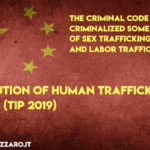
The government decreased law enforcement efforts. Articles
110(a) and 128(b) of the criminal code criminalized sex and
labor trafficking and prescribed penalties of five to 15 years
imprisonment and a fine between two million lek ($18,080)
and five million lek ($45,210), which were sufficiently stringent
and, with respect to sex trafficking, commensurate with those
prescribed for other serious crimes, such as rape. The state
police investigated 69 cases with 80 suspects (69 cases with 69
suspects in 2016); 22 of these suspects in 2017 were investigated
for child trafficking (22 in 2016) and 58 for adult trafficking
(47 in 2016). The Serious Crimes Prosecutor’s Office (SCPO)
prosecuted five defendants (18 in 2016); two of these suspects
were prosecuted for child trafficking (nine in 2016) and three
for adult trafficking (nine in 2016). Courts convicted seven
traffickers (24 in 2016); one trafficker was convicted for child
trafficking (11 in 2016) and six for adult trafficking (13 in 2016).
All convicted traffickers received prison sentences, which ranged
between eight years and eight months to 17 years.
Authorities continued to investigate and prosecute some
traffickers for the lesser crime of exploitation of prostitution.
Authorities reported the confusion between overlapping
elements of exploitation of prostitution and trafficking and
at times applied the lesser charge because it required less
specialization and time, or due to the false belief that trafficking
crimes required a transnational element. The government
enacted judicial reforms that will eventually change court
jurisdiction for trafficking cases; cases not related to organized
crime will soon fall from the Serious Crimes Court to district
courts, but authorities reported district prosecutors did not
have the experience and capacity to adequately prosecute
trafficking cases. The government operated a closed case task
force to review successful and unsuccessful trafficking cases;
so far the task force has only reviewed two cases. Observers
reported limited resources and constant turnover within law
enforcement created obstacles in maintaining capacity to
investigate trafficking. The government, at times in cooperation
with civil society, trained 20 police officers; 100 employees
of local law enforcement; 40 border police officers; and 127
judges, prosecutors, and judicial police officers. The government
did not report any investigations, prosecutions, or convictions
of government employees complicit in trafficking offenses;
however, official complicity and corruption were significant
concerns. The government signed extradition agreements with
the United Kingdom and Northern Ireland and conducted
joint investigations with Italian and Spanish law enforcement.

